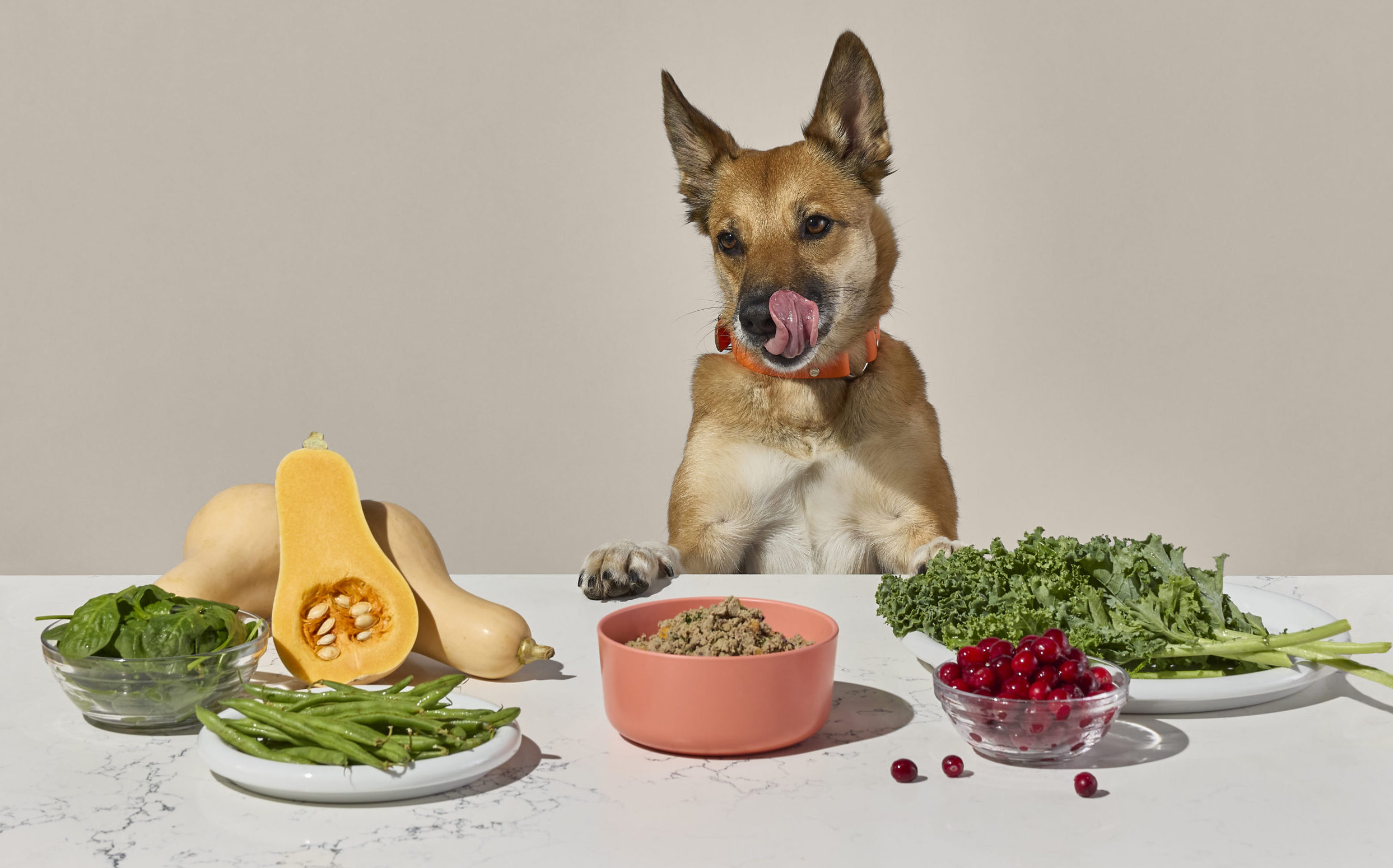Hey Ollie blog readers! We’re offering you an exclusive 60% OFF your starter box! Try now!
As a health-conscious human, you’re likely always sifting through the research about whether organic food is better for you and your family. As a responsible pet parent, you also strive to put healthy, balanced meals in your pup’s bowl.
However, is organic dog food truly a better option or is it just another dog food marketing ploy? What does the term organic really mean when describing a dog’s food formulation and preparation?
The short answer: Organic dog food is often not everything marketers claim it to be. Learn about the top five most concerning organic dog food issues and follow our tips for making healthy choices for your pup.
1. Organic Dog Food Is Unregulated
Unlike organic food for human consumption, organic dog food has no clear standards or definitions to ensure the products are indeed what marketers claim them to be. The U.S. Department of Agriculture (USDA) has yet to define the term organic as it applies to pet foods, so the Association of American Feed Control Officials (AAFCO) sets the standards for the National Organic Program (NOP), and the individual states are instructed to regulate them.
2. Organic Dog Food Labels Can Be Misleading
Although a packaging label stating that a product is organic dog food leads you to believe the food inside is healthy, you’ll have to look closer to determine the product’s true value. According to NOP regulations, for a dog food to bear the coveted organic seal, at least 95% of its ingredients by weight must be organic. Alternatively, labels can state that their food is made with organic ingredients if at least 70 % of the ingredients in the dog food are organic. However, pet food companies can claim their food is organic even when the package doesn’t contain a single organic ingredient, because no regulatory agency requires pet food manufacturers to prove their health claims.
7 Best Dog Food Ingredients to Look For
3. Organic Dog Food Can Be Unhealthy
The term organic is not synonymous with health. In other words, organic dog foods are not guaranteed to be good for your pup. Foods made with organic ingredients may still undergo heavy processing to make the food shelf stable, thus stripping the ingredients of their nutritional value. In addition, according to Greg Aldrich, PhD, a research associate professor and pet food program coordinator at Kansas State University, Manhattan, Kansas, securing the raw ingredients for a truly organic pet food within AAFCO guidelines is difficult. In other words, the organic dog food you purchase may genuinely be organic, but nutritionally incomplete.
4. Organic Dog Food Is Expensive
The term organic is often used to increase a dog food’s perceived value and consumer satisfaction, and to charge a high price! However, because the commercial dog food industry lacks strict regulations, some organic pet food brands are using chemicals and preservatives in their foods while others are using an organic label without being honest about their ingredients. Buyer beware: You may be paying more for food that simply isn’t worth it.
Not all dog foods are created equal. At Ollie, we’re dedicated to 100% transparency about the fresh whole-food ingredients we use in each of our recipes. Our meals are formulated to meet the nutritional levels established by the AAFCO Dog Food Nutrient Profiles for All Life Stages.
Ollie Recipe Spotlight: Beef Dish with Sweet Potatoes
5. Organic Ingredients Aren’t Necessarily Better for Dogs
According to Dr. Aldrich, “There are no documented positive nutritional, health, or safety benefits to organic [dog food].” Studies have presented the pros and cons of grains, raw food, and specific ingredients, but research on organic ingredients’ impact on a dog’s diet is surprisingly lacking. Therefore, you cannot determine whether organic dog food is healthier for your pup or has the same benefits as nonorganic food.Our Ollie team does know this: Dogs need and deserve a healthy diet made with real, high-quality ingredients that are nutritionally balanced.
10 Benefits of Switching to Fresh Dog Food
Healthy Ingredients to Look for in Organic Dog Food
Finding an authentically healthy and well-formulated food for your pup can feel a bit like being a detective, requiring you to look past slick marketing and read between the lines to separate imposters from legitimately high-quality dog food brands. Simplify your search by looking for foods with healthy main ingredients such as:
- Meat proteins — Meats, such as chicken, beef, lamb, fish, or turkey, should be the primary ingredient and ideally a whole food (i.e., not a by-product or meal). Avoid feeding your pup foods with plant-based proteins such as corn and soybean meal.
- Healthy fats — Look for foods containing healthy fat sources such as animal fat, omega-3 and 6 fatty acids, fish oil, flaxseed oil, and eggs.
- Balance of simple and complex carbohydrates — Balanced carbohydrates provide energy and essential vitamins and minerals, and help dogs feel satisfied. Healthy carbohydrate sources include fruits, vegetables, sweet potatoes, white or brown rice, oatmeal, barley, and quinoa.
- Fruits and vegetables — Fruits and vegetables are packed with key nutrients and antioxidants which contribute to your dog’s overall health, plus these ingredients add color and flavor to your pup’s bowl. Look for superfood ingredients such as spinach, kale, blueberries, sweet potatoes, and carrots.
Is Organic Dog Food Better for Pups With Allergies?
Although organic dog food may seem like a good option for dogs who have allergies, such a diet may have little or no effect on your pup’s itchy skin or digestive upset. An allergy is a complex condition that requires veterinary diagnosis, including diagnostic testing, to determine your pup’s allergen (e.g., food proteins, pollen, grasses, mold). To help your allergic dog, your veterinarian must provide targeted therapies to control your pup’s allergen exposure and desensitize their immune system. Although organic dog food is unlikely to harm your allergic pup, you should speak with your veterinarian to determine the diet that will be most effective at helping resolve your dog’s condition.
Organic dog food is an offshoot of the human organic food industry. However, the lack of organic dog food regulations, limited research, and undefined terminology make organic foods a questionable choice for your pup’s bowl.
Tagged As:

The nutrition your dog needs,
the food they want.

Enjoying our articles? Subscribe our Newsletters and get new articles directly to your inbox
You might also like
21 July 2025
6 MINS READ
Can Dogs Eat Nuts? Which Nuts Are Safe & Serving Guide
Can dogs have nuts? Some nuts are fine in moderation, but others can cause serious harm. This quick guide breaks down which nuts are safe for dogs, which to skip, and how to feed nut butters respon…
18 July 2025
4 MINS READ
New Puppy Diet Recommendations for Healthy, Happy Growth
As a new pup parent, one of the biggest ways you can support your puppy’s long-term health is by providing the right nutrition. A puppy’s dietary needs are different from an adult dog’s, and…
by Ollie Pets
18 July 2025
5 MINS READ
How Human-Grade Dog Food Benefits Your Pup’s Health and Happiness
You’ve likely heard the term “human-grade” dog food, but what does it really mean, and is it worth it? Choosing human-grade food can be a significant investment for your dog’s long-term he…
by Ollie Pets







